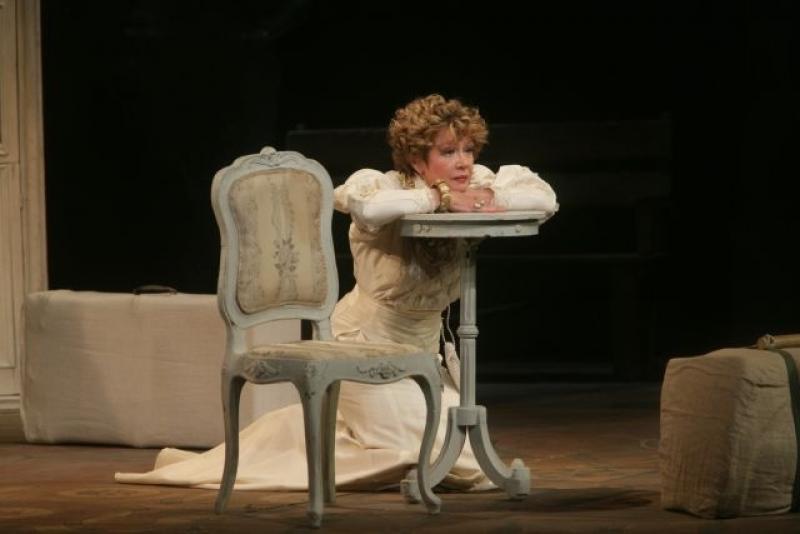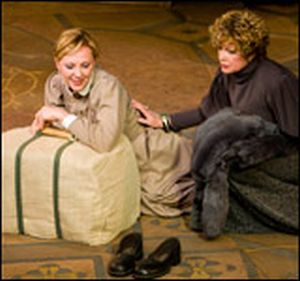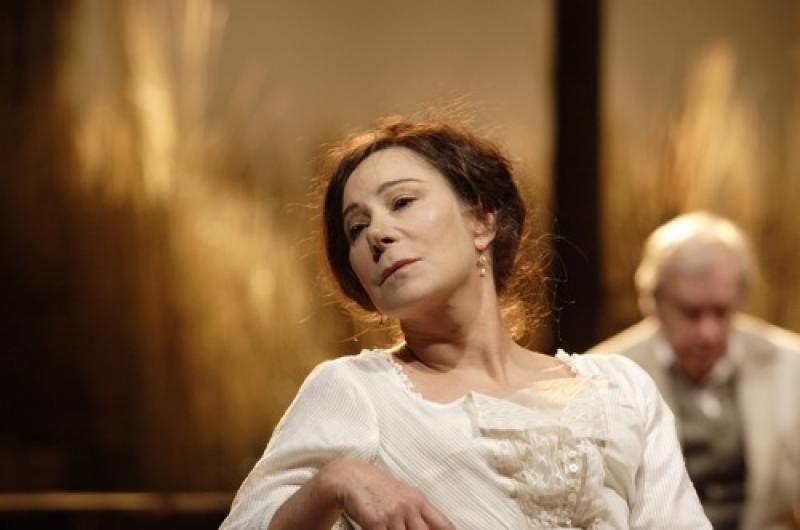The Cherry Orchard, Sovremennik, Noël Coward Theatre | reviews, news & interviews
The Cherry Orchard, Sovremennik, Noël Coward Theatre
The Cherry Orchard, Sovremennik, Noël Coward Theatre
Russians soar in third, and final, offering of their first-ever London season

Plays these days come not in single spies but in battalions of two, whether you're talking The Master Builder, King Lear or The Cherry Orchard, the last of which closes the visiting Sovremennik Russian theatr
To be honest, I had begun dragging my heels somewhat about this production, having heard distinctly mixed reports about the company's first two London openings, and the fact that some of the ensemble have apparently been living with these roles for years isn't necessarily a virtue. There's always the risk that too prolonged an immersion in a single part will lead to complacency, self-satisfaction or worse. And near the start, as a handful of the leads take to the lip of the stage in a showy tableau vivant that elicits the applause for which it's clearly intended, one fears a collective vanity project. How wrong - happily - one turns out to be.
For that near-total shift in response, one can't credit too highly the overwhelmingly charismatic Ranevskaya of Marina Neelova, a fleshier (and younger) Prunella Scales lookalike who brings to the role a mixture of dolorousness and vivacity that is ravishing to behold. From the outset, you clock the way she and her hyper-loquacious brother Gayev (Igor Kvasha) form both a familial and status-related barrier to the nouveau riche peasant's son, Lopakhin (Sergey Garmash), whose cautionary words about the sale of the orchard fall on a tellingly sychronised crossing of legs from brother and sister that has "stay away" written right across it. (Earlier, offering her hand for Lopakhin to kiss, this Ranevskaya looks in the other direction so she won't have to see him.)
 Neelova (pictured right, with Elena Yakovleva as Varya) is revelatory throughout. A vision in flowing cream, then fuschia and finally grey, she intriguingly suggests a flightiness that is less a departure from reality than a response to it: this is a woman who has known too much (dead son, lost love, dwindling finances) and has erected a delicate, girlish dance as a defense against life's abrasions. There's a brilliant moment where she sits up, startled at the sound of two champagne flutes clinking, only then to proceed to jangle the glasses together in a semi-aware surrender to agitation as part of the percussive undertow of existence. And for all her physical elasticity - she all but makes love to the table in the nursery to which she has returned after five years - this Ranevskaya stiffens visibly when confronted with the inevitable reckoning with which the party scene comes crashing to a halt.
Neelova (pictured right, with Elena Yakovleva as Varya) is revelatory throughout. A vision in flowing cream, then fuschia and finally grey, she intriguingly suggests a flightiness that is less a departure from reality than a response to it: this is a woman who has known too much (dead son, lost love, dwindling finances) and has erected a delicate, girlish dance as a defense against life's abrasions. There's a brilliant moment where she sits up, startled at the sound of two champagne flutes clinking, only then to proceed to jangle the glasses together in a semi-aware surrender to agitation as part of the percussive undertow of existence. And for all her physical elasticity - she all but makes love to the table in the nursery to which she has returned after five years - this Ranevskaya stiffens visibly when confronted with the inevitable reckoning with which the party scene comes crashing to a halt.
If Neelova is the self-evident occasion of Galina Volchek's staging, particular kudos is also due Elena Yakovleva's rivetingly unself-pitying Varya (in some ways the play's best role) and a mock-severe governess from Olga Drozdova, who delivers this most eccentric of Chekhovian "turns" with a rabid German accent and the suggestion that this gleaming-eyed trickster may actually be genuinely bonkers.
Some of the performances don't land. Younger sister Anya (Viktoria Romanenko) is too diffident to engage, and Valentin Gaft, as the abandoned butler Firs, seems too young for the part, just as Valery Shalnykh's "young butler" Yasha would seem to be that character's father. (His mustard-coloured attire, meanwhile, gives off the disconcerting air of Archie Rice on a bad night.) Audience response would suggest that Gaft is the great star in Russian observers' eyes, but his character's fate isn't as moving as the reappearance of the principals in a ghostly, candlelit farewell, the Ranevskys on their way to becoming shadows on the estate where they once shone. (Also worth noting: the felling of the orchard, here unexpectedly accompanied by the grunts of the exertions involved.)
The set by Pavel Kaplevich and Peter Kirillov may not represent the last word - indeed, any word - in sophistication, large, tissue-paper-like trees seeming to intrude into the playing area just as talk of the orchard soon becomes the elephant in the room. But those who prefer their Chekhov deconstructed have ample opportunity elsewhere for that - New York's Wooster Group, for one. Here, for the first time in some while, is the Russian master in the West End, performed in his native tongue and speaking a universal language of displacement and longing. And if you arrived as I did ready to scoff at a self-evidently reverential audience awash in bling (a Broadway opening in a blizzard wouldn't be this given over to fur), well, just wait: the cheers at the curtain call are long, loud and richly deserved.
MORE CHEKHOV ON THEARTSDESK
The Cherry Orchard, National Theatre (2011). Zoë Wanamaker (pictured below) shines in Howard Davies's murky production of Chekhov
Uncle Vanya, The Print Room (2012). Chekhov at his most tenderly intimate
A Provincial Life, National Theatre Wales (2012). Moments of visual beauty punctuate a Chekhov adaptation that struggles to find its focus
Three Sisters, Young Vic (2012) Benedict Andrews' energetic update is stronger on ensemble work than individual performances
 Uncle Vanya, Vakhtangov Theatre Company (2012). Anti-naturalistic Russian Chekhov buries humanity under burlesque and mannerism
Uncle Vanya, Vakhtangov Theatre Company (2012). Anti-naturalistic Russian Chekhov buries humanity under burlesque and mannerism
Uncle Vanya, Vaudeville Theatre. Anna Friel, Laura Carmichael and Ken Stott shine bright in Lindsay Posner's production of Chekhov's drama
Longing, Hampstead Theatre (2013). William Boyd's dramatisation of two Chekhov stories with Iain Glen and Tamsin Greig is more pleasant than towering
The Cherry Orchard, Young Vic (2014). Katie Mitchell delivers Chekhov's masterpiece with devastating power
Uncle Vanya/Three Sisters, Wyndham's Theatre (2014). Quiet truth in finely observed ensemble Chekhov from the Mossovet State Academic Theatre
Winter Sleep. Turkish master Nuri Bilge Ceylan’s Cannes Palme d'Or winner, based on Chekhov short stories, is huge in every sense
The Seagull, Regent's Park Open Air Theatre (2015). Strikingly staged Chekhov continues a strong season in the park
Uncle Vanya, Almeida Theatre (2016). Robert Icke's lengthy Chekhov revival/reappraisal is largely a knockout
Young Chekhov, National Theatre (2016). Jonathan Kent's three-play Chekhovathon builds to a shattering climax
Wild Honey, Hampstead Theatre (2016). Early Chekhov begins strongly then falls away
The future of Arts Journalism
You can stop theartsdesk.com closing!
We urgently need financing to survive. Our fundraising drive has thus far raised £49,000 but we need to reach £100,000 or we will be forced to close. Please contribute here: https://gofund.me/c3f6033d
And if you can forward this information to anyone who might assist, we’d be grateful.

Subscribe to theartsdesk.com
Thank you for continuing to read our work on theartsdesk.com. For unlimited access to every article in its entirety, including our archive of more than 15,000 pieces, we're asking for £5 per month or £40 per year. We feel it's a very good deal, and hope you do too.
To take a subscription now simply click here.
And if you're looking for that extra gift for a friend or family member, why not treat them to a theartsdesk.com gift subscription?
more Theatre
 Edinburgh Fringe 2025 reviews: Ordinary Decent Criminal / Insiders
Two dramas on prison life offer contrasting perspectives but a similar sense of compassion
Edinburgh Fringe 2025 reviews: Ordinary Decent Criminal / Insiders
Two dramas on prison life offer contrasting perspectives but a similar sense of compassion
 Edinburgh Fringe 2025 reviews: Kinder / Shunga Alert / Clean Your Plate!
From drag to Japanese erotica via a French cookery show, three of the Fringe's more unusual offerings
Edinburgh Fringe 2025 reviews: Kinder / Shunga Alert / Clean Your Plate!
From drag to Japanese erotica via a French cookery show, three of the Fringe's more unusual offerings
 The Two Gentlemen of Verona, RSC, Stratford review - not quite the intended gateway drug to Shakespeare
Shakespeare trying out lots of ideas that were to bear fruit in the future
The Two Gentlemen of Verona, RSC, Stratford review - not quite the intended gateway drug to Shakespeare
Shakespeare trying out lots of ideas that were to bear fruit in the future
 Edinburgh Fringe 2025 reviews: The Horse of Jenin / Nowhere
Two powerful shows consider the Israeli-Palestinian conflict, with mixed results
Edinburgh Fringe 2025 reviews: The Horse of Jenin / Nowhere
Two powerful shows consider the Israeli-Palestinian conflict, with mixed results
 Edinburgh Fringe 2025 reviews: The Fit Prince / Undersigned
A joyful gay romance and an intimate one-to-one encounter in two strong Fringe shows
Edinburgh Fringe 2025 reviews: The Fit Prince / Undersigned
A joyful gay romance and an intimate one-to-one encounter in two strong Fringe shows
 Tom at the Farm, Edinburgh Fringe 2025 review - desire and disgust
A visually stunning stage re-adaptation of a recent gay classic plunges the audience into blood and earth
Tom at the Farm, Edinburgh Fringe 2025 review - desire and disgust
A visually stunning stage re-adaptation of a recent gay classic plunges the audience into blood and earth
 Works and Days, Edinburgh International Festival 2025 review - jaw-dropping theatrical ambition
Nothing less than the history of human civilisation is the theme of FC Bergman's visually stunning show
Works and Days, Edinburgh International Festival 2025 review - jaw-dropping theatrical ambition
Nothing less than the history of human civilisation is the theme of FC Bergman's visually stunning show
 Every Brilliant Thing, @sohoplace review - return of the comedy about suicide that lifts the spirits
Lenny Henry is the ideal ringmaster for this exercise in audience participation
Every Brilliant Thing, @sohoplace review - return of the comedy about suicide that lifts the spirits
Lenny Henry is the ideal ringmaster for this exercise in audience participation
 Edinburgh Fringe 2025 reviews: The Beautiful Future is Coming / She's Behind You
A deft, epoch-straddling climate six-hander and a celebration (and take-down) of the pantomime dame at the Traverse Theatre
Edinburgh Fringe 2025 reviews: The Beautiful Future is Coming / She's Behind You
A deft, epoch-straddling climate six-hander and a celebration (and take-down) of the pantomime dame at the Traverse Theatre
 Good Night, Oscar, Barbican review - sad story of a Hollywood great's meltdown, with a dazzling turn by Sean Hayes
Oscar Levant is an ideal subject to refresh the debate about media freedom
Good Night, Oscar, Barbican review - sad story of a Hollywood great's meltdown, with a dazzling turn by Sean Hayes
Oscar Levant is an ideal subject to refresh the debate about media freedom
 Edinburgh Fringe 2025 reviews - Monstering the Rocketman by Henry Naylor / Alex Berr
Tabloid excess in the 1980s; gallows humour in reflections on life and death
Edinburgh Fringe 2025 reviews - Monstering the Rocketman by Henry Naylor / Alex Berr
Tabloid excess in the 1980s; gallows humour in reflections on life and death
 Edinburgh Fringe 2025 reviews: Lost Lear / Consumed
Twists in the tail bring revelations in two fine shows at the Traverse Theatre
Edinburgh Fringe 2025 reviews: Lost Lear / Consumed
Twists in the tail bring revelations in two fine shows at the Traverse Theatre

Add comment